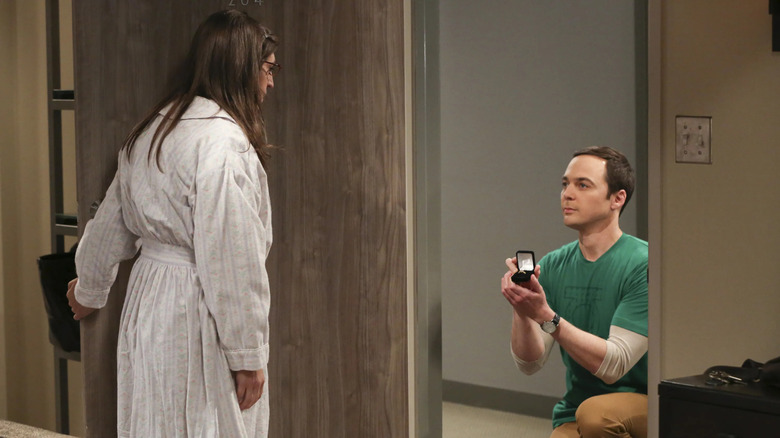Why The Big Bang Theory Changed Its Showrunner During Its Peak
After season 10 of "The Big Bang Theory," when the show was raking in almost 19 million viewers a week, showrunner Steve Molaro left. He was replaced by executive producer Steve Holland, who would continue running the series until it gracefully ended on its own terms in season 12. Molaro's reason for departing the show was pretty simple: he wanted to make "Young Sheldon," the spinoff prequel series that also turned out to be a huge success in its own right. (It even spawned a spinoff of its own, which premiered in fall 2024.) It wasn't practical for Molaro to run two shows at once, so he prioritized "Young Sheldon" while still keeping an eye on "TBBT" in his spare time.
It's worth noting that Molaro wasn't the showrunner for the first five seasons, either. Before season 6, the show was mainly run by co-creator Bill Prady. He stepped down around 2012 but continued to oversee the series as a producer, just as Molaro would do in seasons 11 and 12. The official showrunner of "TBBT" may have changed twice over its run, but none of those changes were ever particularly severe or dramatic. Everyone who left seemed to leave peacefully on their own terms; it's a far cry from how showrunner Dan Harmon was fired from "Community" after its third season, for instance.
'The Big Bang Theory' was surprisingly consistent
The result of the relatively peaceful behind-the-scenes atmosphere is that "The Big Bang Theory" has no major drops or boosts in quality. Fans may generally prefer the older seasons of the show — which is true for most sitcoms — but there is no hard line between good "TBBT" and bad "TBBT." The show may have evolved over the years, bringing in new characters and letting old characters change, but those changes happened gradually and organically. The average viewer barely noticed when Prady was replaced by Molaro or when Molaro was replaced by Holland.
That's pretty rare because casual viewers can still often pick up on showrunner shifts. HBO's "Veep," for instance, is still great after its showrunner Armando Iannucci left post-season 4, but the show was noticeably blunter and meaner going forward. The final two seasons of "Seinfeld" were still fun without Larry David running it, but they also got zanier and faster-paced. With "TBBT," meanwhile, the main difference in the post-Molaro years is that the characters are a little more mature, having continued to evolve on the trajectory seasons 6 through 10 established for them. "TBBT" may not be as critically acclaimed as a lot of its contemporaries, but it held a consistency and longevity very few sitcoms can match.

